When you visit Morocco, you should definitely check out Gnawa music. It’s an exciting mix of African, Arab, and Berber traditions. This music has a special history that goes back to the times of the trans-Saharan slave trade. You can hear the unique sounds of the guembri, a three-stringed instrument that has a deep and soulful tone. The qraqab, which are metal clappers, add a lively rhythm that makes you want to dance.
Listening to Gnawa music is more than just enjoying the sounds. It’s about feeling a connection to something deeper. The master musicians lead the performances, and they play a big role in the community. When you experience the ceremonies that often accompany this music, you’ll see how important it is to the people and their culture.
What’s really interesting is how Gnawa music is changing over time. It’s still a big part of Moroccan life today, and you might notice new influences blending in with the traditional sounds. Whether you’re in a lively market or at a special ceremony, hearing Gnawa music will be an unforgettable experience that shows you the heart and soul of Morocco.
Origins and Evolution of Gnawa
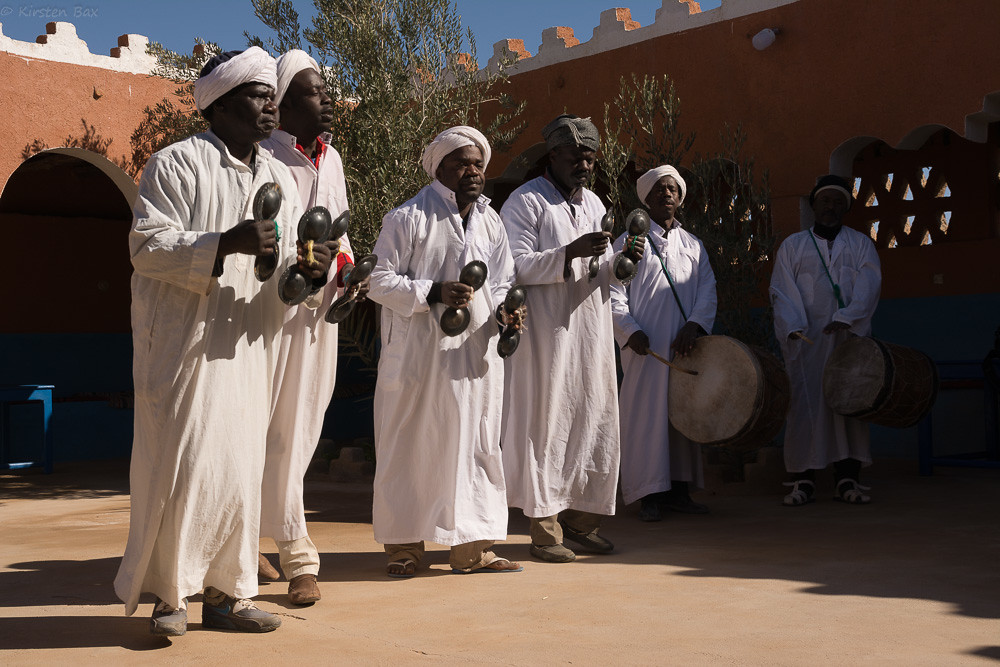
Gnawa music is a fascinating and vibrant part of Moroccan culture. It has its roots in the history of enslaved Africans who came to Morocco during the trans-Saharan slave trade. This music blends African, Arab, and Berber traditions, creating a rich tapestry that tells stories of resilience and identity. The word “Gnawa” is thought to come from a Berber term meaning “dumb,” but it actually reflects a deep spiritual expression and connection to their history.
Originally, Gnawa music was used in spiritual practices and healing ceremonies. It played a big role in traditional rituals. The teachings of Sidi Bilal, who was the first person to call Muslims to prayer, helped shape this music. He connected Islamic beliefs with the older animist beliefs of Africa. Over the years, Gnawa music transformed from a strictly ritualistic practice into a recognized genre that is celebrated around the world.
One of the best ways to experience Gnawa music is at the Essaouira Gnawa Festival. This festival started in 1998 and showcases lively performances that celebrate both traditional and modern styles of Gnawa music. It is a vibrant event that highlights the importance of this music in bringing people together and forming a community. Attending this festival is a chance to feel the energy and life-changing power of Gnawa music firsthand.
Musical Elements and Techniques
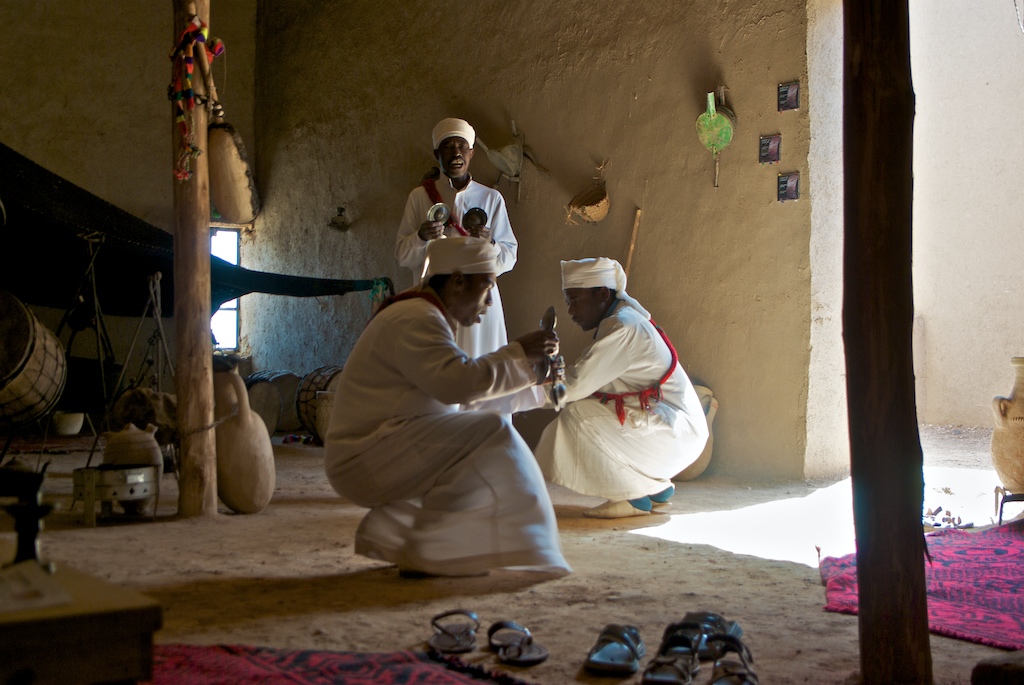
If you’re looking for a unique musical experience, you have to check out Gnawa music! This vibrant tradition comes from Morocco and is famous for its amazing sounds that will grab your attention right away. At the center of Gnawa music is the guembri, a special three-stringed lute that plays beautiful melodies. Alongside it, you’ll hear the qraqab, which are metal castanets, and the ganga, a type of drum. Together, these instruments create a lively and rich rhythm that is hard to resist.
One of the coolest parts of Gnawa music is its complex rhythms. The beats often mix together in surprising ways, making it both exciting and mesmerizing. This rhythmic blend helps create a trance-like feeling during performances. You might find yourself getting lost in the music, feeling its energy all around you.
Another key element is the chanting of Lila. This is a special practice where musicians repeat songs for hours, telling stories about different spirits. This repetitive singing not only adds to the enchanting experience but also strengthens the bond between everyone present. It’s a way for the community to come together and share their culture.
Improvisation is also a big part of Gnawa music. Musicians often change their rhythms and melodies based on how the audience is feeling. This means that each performance is one-of-a-kind, making every show an exciting adventure. You never know what to expect!
Rituals and Ceremonies
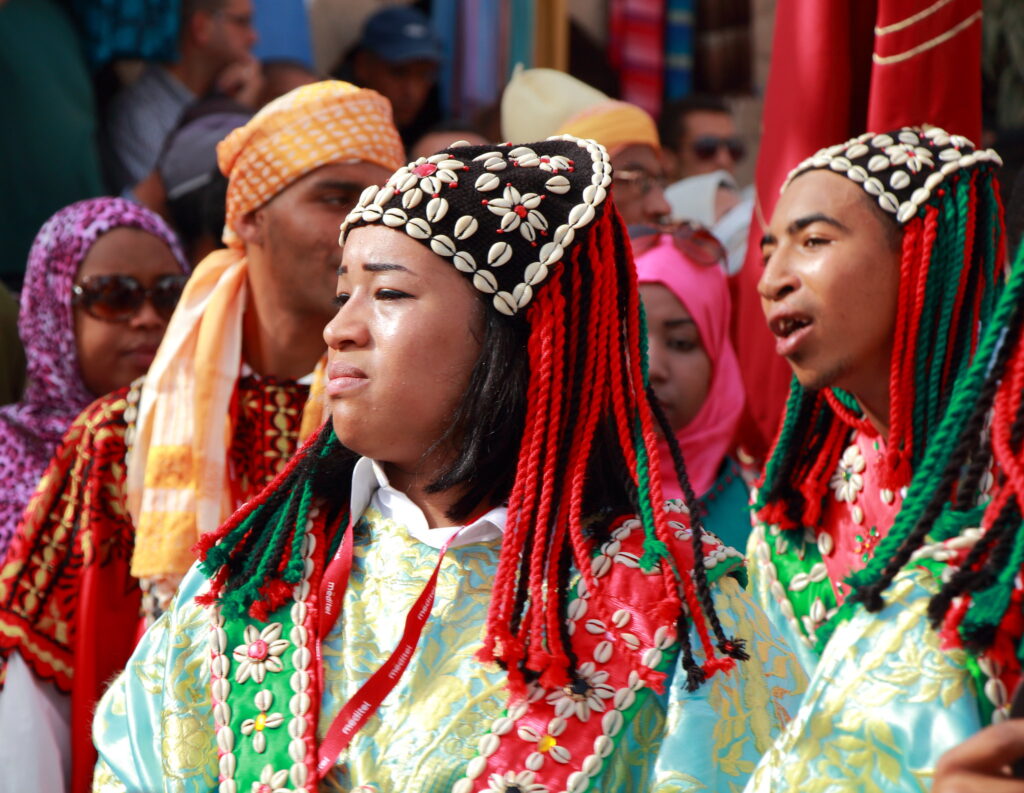
Explore the enchanting world of Gnawa music and its vibrant rituals and ceremonies. If you’re new to this captivating culture, let me guide you through it. At the heart of these ceremonies, called lilas, are the maâlems, who are master musicians. They lead the community in healing rituals that last from dusk till dawn. When people gather for these events, you can feel the excitement in the air.
The rituals happen in three main phases: aada, kuyu, and muluk. During aada, the community gets ready for something special. The chants and drumbeats start to fill the space, setting the mood for spiritual connection. Next comes kuyu, where the music picks up energy. It invites everyone to connect with their ancestral spirits. This powerful moment can lead to the final phase, muluk, where some participants may feel possessed by these spirits, truly honoring their presence.
These ceremonies create a strong sense of belonging and cultural identity. They pull community members together in a way that feels magical. One great way to experience this is at the Gnaoua World Music Festival in Essaouira. This event draws people from all over who love to celebrate and learn about the rich traditions of Gnawa music.
Joining in these rituals is a chance for travelers to dive deep into the spiritual and communal heart of Gnawa music. So, if you find yourself in Morocco, don’t miss the opportunity to witness these incredible ceremonies. They offer a unique and unforgettable experience that connects you with the local culture.
Cultural Influences and Intersections
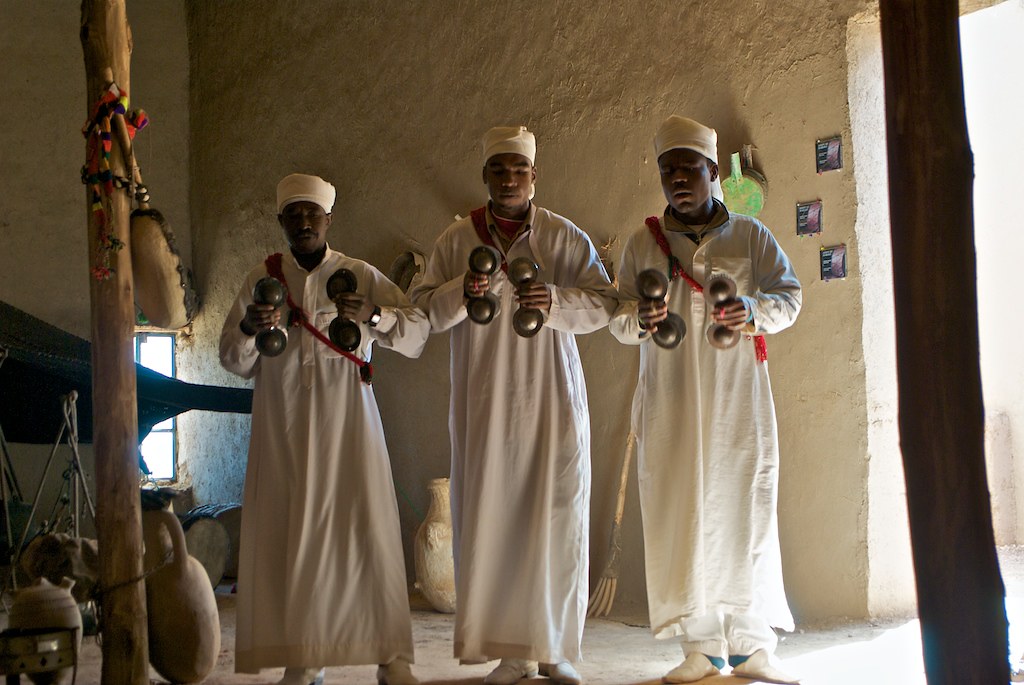
Gnawa music is a fascinating part of Morocco’s culture that travelers should definitely explore. This unique music style has deep roots in a rich history and reflects the mix of different cultures in Morocco. You can hear influences from Africa, Arab traditions, and Berber heritage in its sound. Gnawa music is a way for the descendants of enslaved Africans to express their cultural identity and share their stories.
What makes Gnawa music even more special is that it’s not just about entertainment; it has spiritual meanings too. It combines elements of animism, which is the belief that everything has a spirit, and Sufi mysticism, a form of Islamic spirituality. The instruments used in Gnawa music, like the guembri (a three-stringed bass), qraqab (metal castanets), and ganga (a type of drum), are very important. They are symbols of the Gnawa people’s culture and spirituality.
If you’re interested in how Gnawa music has changed over time, you’ll find that it has evolved to include modern styles like jazz and rock. This blending of sounds shows how adaptable Gnawa music is while still keeping its traditional roots. A great place to experience this fusion is at the Gnaoua World Music Festival in Essaouira. This festival attracts artists and music lovers from all over the world and showcases the importance of Gnawa music in Morocco’s cultural scene.
Visiting Essaouira during the festival allows you to see how Gnawa music connects people across different backgrounds and cultures. It’s an exciting way to appreciate the beauty of music that crosses borders and traditions. If you’re traveling to Morocco, make sure to dive into the world of Gnawa music—you won’t regret it!
Social Aspects and Storytelling
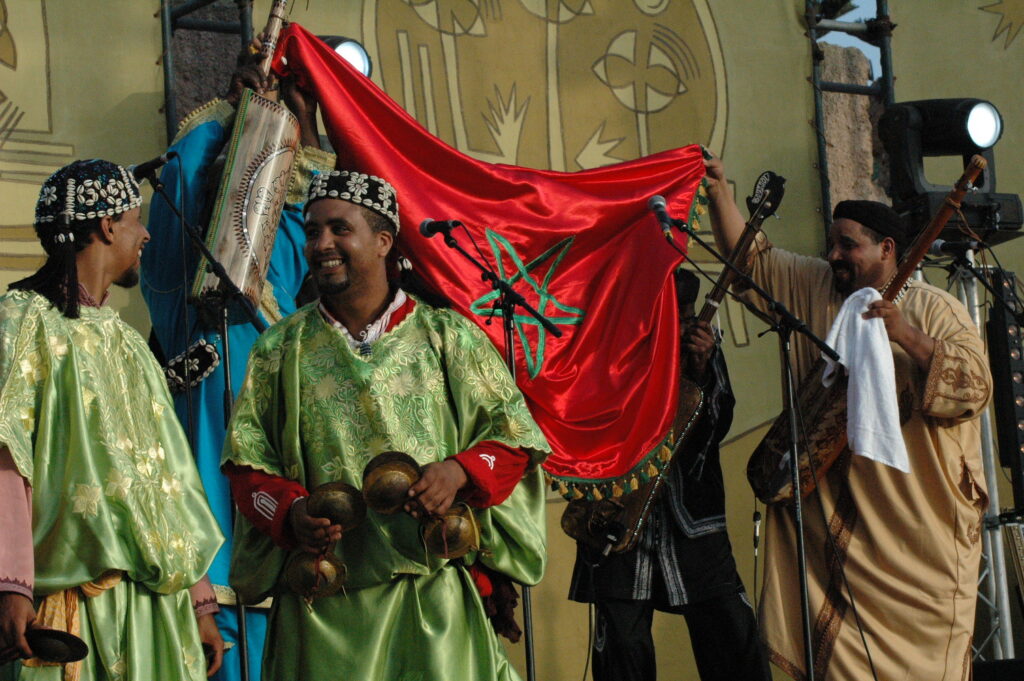
If you ever find yourself in Morocco, be sure to check out Gnawa music. This unique style of music is more than just a form of entertainment; it’s an amazing way to experience the stories and history of the Gnawa people. When you listen to Gnawa music, you’ll hear powerful chants and lyrics that share stories of struggle, resilience, and hope. The master musicians, called maalems, use their music to spread messages about race equality, tolerance, and peace.
Attending a Gnawa music ceremony is a must-do. These events are not just concerts; they are lively gatherings that create a strong sense of community. You’ll feel the shared cultural heritage and collective memory that brings everyone together. The maalems pass down stories through generations, keeping the rich history alive even as the world changes around them.
What’s really special about Gnawa music is how it connects with people outside of the community. As modern influences mix with this traditional music, more and more travelers are discovering its magic. Listening to Gnawa music can inspire you to think about your own life and dreams for freedom. So, if you’re looking for a cultural experience that will touch your heart and open your mind, dive into the world of Gnawa music!
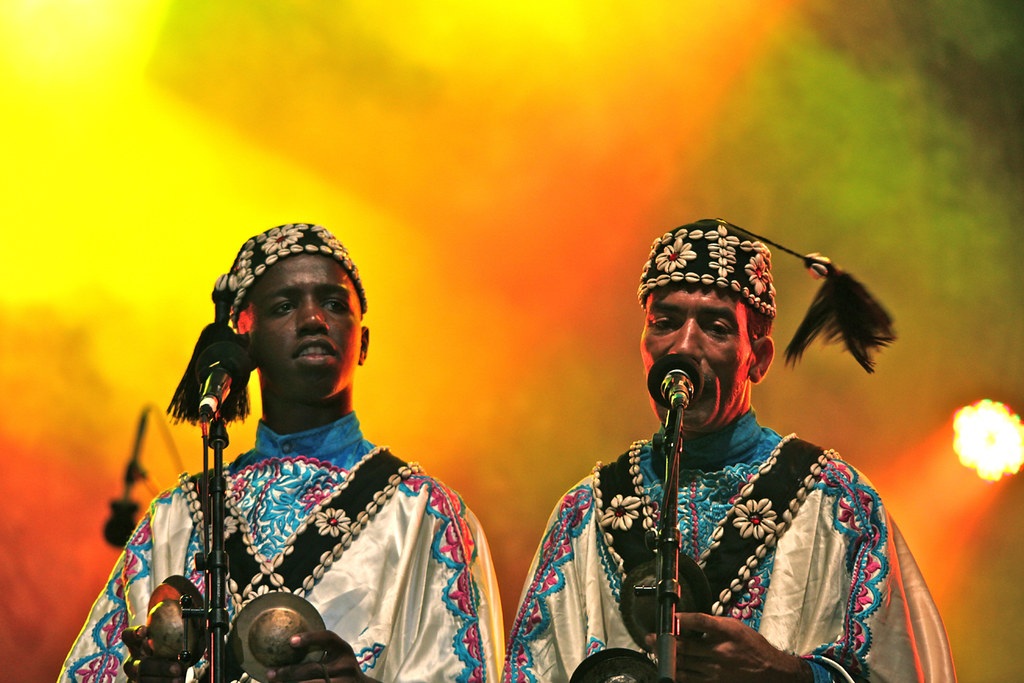
Frequently Asked Questions
Gnawa music is a traditional genre that originated in Morocco, characterized by its unique blend of African rhythms and Islamic spiritual chants. It has a rich history rooted in the sub-Saharan region and has evolved over time through cultural exchanges with various communities.
Gnawa music traces its origins back to the descendants of enslaved Africans who were brought to Morocco centuries ago. These individuals preserved their African musical traditions while incorporating elements of Islamic spirituality. Over time, Gnawa developed into a distinct genre, blending African rhythms with Moroccan influences.
Gnawa music incorporates various instruments such as the guembri (a three-stringed lute), Qraqeb (metal castanets), and Tbel (drum). The rhythmic patterns created by these instruments form the backbone of Gnawa music. Call-and-response vocals, improvisation, and trance-inducing melodies are essential components of this captivating musical style.
Yes, rituals and ceremonies play an integral role in the Gnawa tradition. These events often involve spiritual healing practices led by Maâlems (master musicians) who guide participants through trance-like states using repetitive rhythms and incantations. The purpose is to connect with spiritual entities known as jinn and seek healing for various ailments.
Gnawa has had significant cultural intersections with diverse communities throughout history. Its influence can be seen in other genres such as jazz, blues, reggae, and fusion styles worldwide. This cross-pollination has resulted in collaborations between Gnawa musicians and artists from different backgrounds, contributing to the global resonance of this captivating musical tradition.

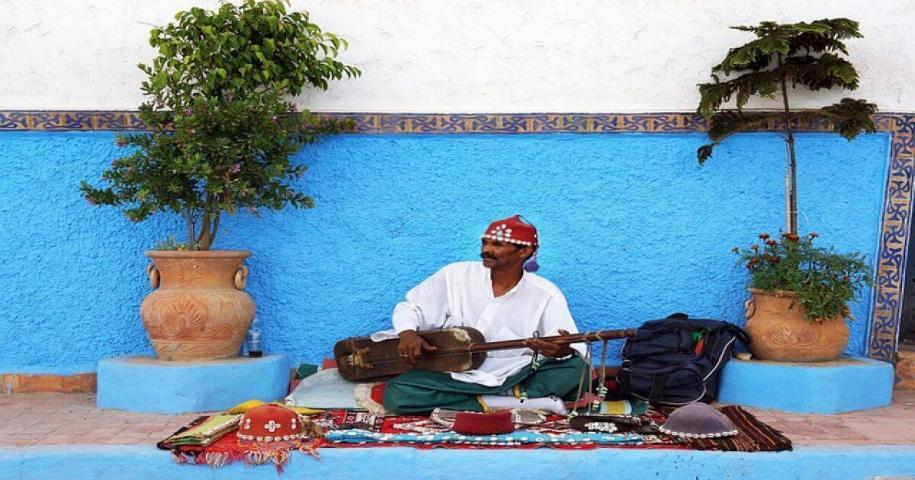
Leave a Reply